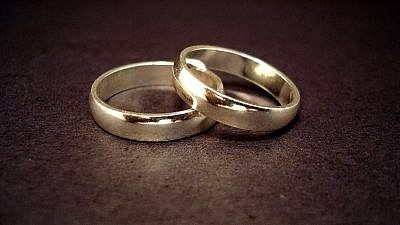When The Forward’s Jenny Singer wrote this week about a tryst she shared with someone who failed to vote for Hillary Clinton in 2016, it was certainly a case of her sharing way too much information with her readers. But her conclusion that dating or sharing a bed with someone whose politics you don’t like is something reasonable people should avoid is hardly unusual. As numerous articles in other publications have reported, growing numbers of profiles of singles on online dating sites contain admonitions warning those of different political persuasions not even to think about contacting them.
That’s interesting not just because it reflects the bifurcated nature of our society in the age of U.S. President Donald Trump, but because it also demonstrates that while some people may have thought that the era of drawing lines between groups with respect to dating and marriage was over, that isn’t true. The only thing that has changed is the characteristics that define the lines that we will no longer cross.
This year, the level of acceptance for intermarriage among non-Orthodox religious institutions was highlighted by the commencement speech of novelist Michael Chabon at the Reform movement’s Hebrew Union College, in which he lambasted the very idea of boundaries between Jews and non-Jews, as well as Israel and its foes. In his view, the restrictive beliefs of Judaism had “lost its hold on the moral imagination” of Jews.
Though I think these views are terrible—and integral to the demographic and ideological trends that threaten to destroy liberal Judaism in the United States—there’s no denying that the population numbers and the declining figures for Jewish affiliation show that his ideas are more accepted than some of us would like to believe.
Yet as Singer’s article and a host of others detailing the shunning of conservatives on dating sites, in addition to the justifications for the public harassment of Trump-administration figures, that drawing of lines is alive and well. It’s just no longer about religion.
The reasons for this are twofold: a rising tide of extreme partisanship and a decline in religious observance among most Americans.
Americans of differing political persuasions no longer read, listen or watch the same media, and have lost the ability to tolerate opposing views or to credit political foes with good intentions. We have become two warring tribes, and our views on just about any issue, especially those about Trump, break down along partisan lines.
This development has been building with each succeeding president, starting with Bill Clinton, engendering a derangement syndrome among his opponents. But the advent of Trump—with his outrageous political stunts, boorish behavior and statements that break all the norms—has exacerbated this trend. Among Jews, this is aggravated by wild accusations that he is an anti-Semite or would-be dictator who is likely to destroy American liberty, if not a Nazi.
Trump can be difficult, if not impossible, to defend at times. However, the willingness not merely to oppose him, but to treat the 63 million Americans who voted for him as “deplorables” (to use Hillary Clinton’s unfortunate phrase) who are willing accomplices to a mythical advent of fascism with whom decent people may not associate—let alone date or mate—is escalating political warfare to a previously unknown level in this country.
This has been accompanied by a decline of religious faith among many Americans. That is especially true among non-Orthodox Jews, whose embrace of liberal secular values has led many to believe that defining ourselves principally by faith is outdated. Many Jewish youth think that supporting a country like Israel, which is sectarian in nature and avowedly the nation state of the Jews rather than one that embraces purely universal values, is unacceptable. So, too, is the notion of restricting one’s romantic choices to fellow Jews. Since non-Jews feel the same—intermarriage rates wouldn’t be high without the freedom that led to a breakdown of religious barriers—intermarriage is now the norm, rather than the exception.
It’s perfectly normal to seek out someone who shares your politics rather than your faith if you are, like most Americans, not religious. Relationships are difficult enough without them being complicated by political arguments, especially in an era when opinions about Trump—and the differences between liberals and conservatives—remain so extreme.
Yet if the majority of American Jews who share Singer’s liberal views agree that politics, as opposed to faith, is the line that one shouldn’t cross, then the consequences are enormous.
A country in which our political beliefs are regarded the way we used to think about religion—as revealed truth in which absolute faith is required, rather than something that friends and neighbors can agree to disagree about—is moving towards a very dangerous place.
The essence of democracy is not just a willingness to compete in elections, but to accept their results and behave as a loyal opposition when you lose. A knee-jerk response should not be to “resist” the other side. Trump may not be a normal president, but most of his policies are normal, and supporting them doesn’t automatically make someone a fascist. If we’ve arrived at the point where we no longer regard our fellow citizens of the opposing party as not just mistaken, but evil—and a member of different warring tribe that must be eradicated, as opposed to debated—then a real line has been crossed, one that might mean no turning back.


























